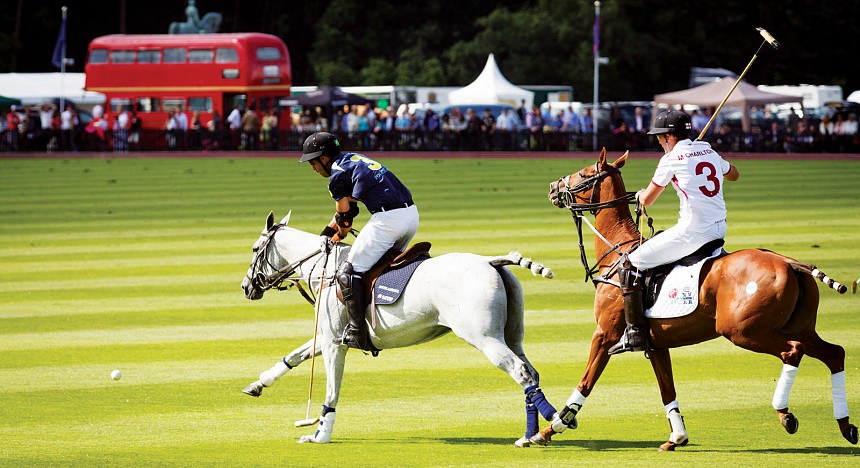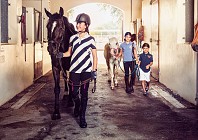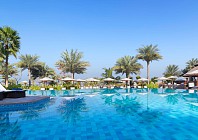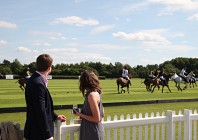It’s a remarkably blue-sky day at the Guards Polo Club at London’s Windsor Great Park, the home of contemporary polo in the British Isles, and on a vibrantly green and immaculately groomed field, I’m about to learn how to play polo. I can’t say it’s ever been on my to-do list till now; polo always seemed the domain of the wealthy and rurally inclined – after all you need a horse or two, don’t you? But according to pedigree player Malcolm Borwick, who splits his time between playing in the international pro circuit and teaching novices how to play the “game of kings”, there is more to polo than meets the eye.
In fact, this ancient sport is enjoying a regal renaissance as its luxurious persona attracts players and spectators from emerging markets across the world; keen to indulge in the rich traditions shared both on and off the polo pitch. “Polo is developing very quickly, in both traditional and emerging destinations,” says Borwick, who recently toured Asia’s fastest-growing polo scenes, including Singapore, China, Malaysia and Korea’s Jeju Island, with one of the game’s biggest supporters, Royal Salute. “From the Middle East to Eastern China, beautiful polo facilities are being built and new players are being drawn to the game. It’s an extremely exciting time to be part of the scene.”

Borwick passes me a slender bamboo mallet and beckons me to line my shoulders up with a painted line in the grass, my legs to either side. I follow his instructions, testing my dexterity on the game’s four principal strokes. With the pendulum grace of a golf chip and the destructive force of a baseball home-run swing, I send a polo ball soaring down the field and quickly see the game’s appeal; there’s a distinct sense of satisfaction after each whack. However, it’s quite another thing to do this six feet up on the back of a moving polo pony, which is what I attempt next, with the help of a patient chestnut-hued animal named Sammy.
The ball looks much smaller and far more difficult to strike from this lofty position and I immediately have a newfound respect for players like Borwick who engage professional teams at high speed during international British Polo Day tournaments. “For adults there is a fear of falling off and that takes a while to get over,” says Borwick, who leads polo clinics for novices to foster new support for the game he loves and has played since childhood. “We have a saying that it takes 100 falls to make a good rider and I’ve done that – comfortably. When we’re playing a match we’re going at 35 miles (56 km) an hour, on half a ton of horse, hitting at 45-degree angles. You do the maths. It’s a pretty big impact.”

This isn’t polo’s first renaissance. A game that’s older than recorded history, polo was first played as a simulated war game by Central Asian nomads, with up to 100 players battling it out on each team. The sport taught essential equestrian skills and helped forge that timeless bond between man and horse. It was eventually adopted by the Persian royal family as a training regime for the king’s elite cavalry.
Modern polo is said to have originated in Manipur, a north-eastern state of India, where The Silchar Polo Club was founded in 1859 by British cavalry officers and plantation owners who observed the locals playing a strategic and fast-paced match on stout polo ponies. It wasn’t long until the game was being played from Rhode Island to Rhodesia, and its place as an essential of high society cemented. “Many of the people who play on the international circuit are very wealthy and for them the game is addictive and the one thing they can’t dominate,” says Borwick as we make our way to the Coronation Cup championship field a short drive away.

“The likes of the owners of Amway or the Coca-Cola family, people from serious wealth, they fall in love with the sport. Polo is the most addictive thing that many players ever do. I don’t think people consciously choose to play because they are wealthy but they might try it or be teased into trying it and then go: ‘Wow, this is amazing.’ The way they grow with the sport and love everything, from the breeding of the horses to the establishment of properties, it is an incredible evolution.”
Polo has earned its nom de plume as the sport of kings. Lord Mountbatten fell in love with the game when he stepped in for an injured player in Jodhpur while accompanying the Prince of Wales on his 1921-1922 tour of India and the Far East. The Prince in turn, taught his nephew, Prince Philip, who taught his son, Prince Charles, who in turn taught princes William and Harry. Royal affiliation is now part and parcel of the polo scene, an aspect that has helped attract new generations of players and spectators from across the world, keen to tap in the game’s rich legacy.

However, polo today represents more than just the chance to rub shoulders with royalty; major luxury brands, including Shanghai Tang, Maserati and Royal Salute, which hosts some of the biggest-profile matches globally, tap into the game’s elegant sense of Britishness, luxury and heritage, using the ancient game as a portal to the newly minted. Even the hotel where I am staying – one of the UK’s grande dame hotels, Claridge’s in Mayfair – shares a long tradition with British polo. Sir Winston Churchill, who resided at the hotel and convened many meetings there during World War II, was a vocal proponent of the sport. In addition to many players calling Claridge’s their home away from home when competing in London, many lavish post-victory celebrations take place in the hotel’s acclaimed 1930s-inspired Fumior cocktail bar.
We arrive at the Royal Salute Coronation Cup, the most illustrious and regal event on the international polo circuit, in a fleet of antique Bentleys and Daimlers, joining London’s high society at the shaded Neolithic Bar, named for the 8,000-year-old Croatian wood used by London architect Sally Mackereth. At the bar marquee celebrity mixologists blend summer-themed cocktails made with 21-year-old Royal Salute whisky. Nearby celebrities and socialites alike attend a silver-service picnic served from baskets created by British design firm Lutyens and set against a sensational Secret Garden designed by award-winning landscaper Stephen Woodhams.

After lunch we make our way to the Royal Box, where we join Prince Charles and assembled VIPs to watch the English team battle it out with arch-rivals South America. There are military marching bands, women in vibrant hats, master sergeants in full regalia, and the city’s beautiful in all their finery. The action on the field is addictive as players gallop their ponies into position, deftly swinging their mallets and placing the ball through the goals in a unique sport that’s part high-speed ballet, part horse-born chess. Eventually England victor over the southern foes but the sense of camaraderie continues at the Secret Garden after party, attended by the next generation of polo players and admirers.
Here, I have a chance to catch up with my teacher Malcolm Borwick once again. “The event was a great success; we had perfect weather for entertaining in the Royal Salute Secret Garden, which created an atmosphere very conducive to drinking 21-year-old blended Scotch,” says the 15-time England team member. “The crowd as ever, at the highest-rated polo match in the Northern Hemisphere, was very diverse. From royalty to your local polo enthusiast, some came for the game, others came for the off-field entertainment. The Royal Salute Coronation Cup is important as it has real heritage in the sport and has been played by the best players in the world for over 80 years. Socially it is a feature of the London season and draws interest from around the world.”

While events like the Coronation Cup attract plenty of old money and boast a rich, regal heritage, more contemporary tournaments are now played across the world, from Argentina and Australia to modern-day Jodhpur, where the present monarch, the Maharaja Gaj Singh II of Marwar-Jodhpur, remains a proud advocate of the city’s reinvigoration as home of India’s polo revival. Polo has returned to Mongolia, where it was played in the Middle Ages, and to the steppes of Kazakhstan. It’s played in the UAE and in the Australian heartland. It’s also been quickly adopted in China, where more than 10 clubs have opened and where the game is synonymous with the trappings of contemporary affluent living. Winston Churchill said a polo handicap was a passport to the world. Fortunately it seems there is no shortage of players and wealthy travellers looking to follow this ancient game to its greatest matches, no matter where they may be.











